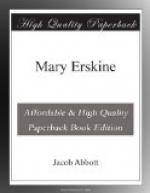Mrs. Bell spent a great deal of time, during the day, in trying to think what it would be best for Mary Erskine to do, and also in trying to think what she could herself do for her. She, however, made very little progress in respect to either of those points. It seemed to her that Mary Erskine could not move into the new house, and attempt to carry on the farm, and, on the other hand, it appeared equally out of the question for her to remain where she was, in her lonesome log cabin. She might move into the village, or to some house nearer the village, but what should she do in that case for a livelihood. In a word, the more that Mrs. Bell reflected upon the subject, the more at a loss she was.
She determined to go and see Mary Erskine after dinner, again, as the visit would at least be a token of kindness and sympathy, even if it should do no other good. She arrived at the house about the middle of the afternoon. She found Mary Erskine busily at work, putting the house in order, and rectifying the many derangements which sickness and death always occasion. Mary Erskine received Mrs. Bell at first with a cheerful smile, and seemed, to all appearance, as contented and happy as usual. The sight of Mrs. Bell, however, recalled forcibly to her mind her irremediable loss, and overwhelmed her heart, again, with bitter grief. She went to the window, where her little work-table had been placed, and throwing herself down in a chair before it, she crossed her arms upon the table, laid her forehead down upon them in an attitude of despair, and burst into tears.
Mrs. Bell drew up toward her and stood by her side in silence. She pitied her with all her heart, but she did not know what to say to comfort her.
Just then little Bella came climbing up the steps, from the stoop, with some flowers in her hand, which she had gathered in the yard. As soon as she had got up into the room she stood upon her feet and went dancing along toward the baby, who was playing upon the floor, singing as she danced. She gave the baby the flowers, and then, seeing that her mother was in trouble, she came up toward the place and stood still a moment, with a countenance expressive of great concern. She put her arm around her mother’s neck, saying in a very gentle and soothing tone,




